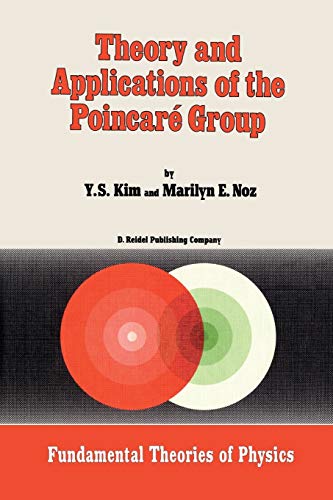Articoli correlati a Theory and Applications of the Poincaré Group: 17

Le informazioni nella sezione "Riassunto" possono far riferimento a edizioni diverse di questo titolo.
Le informazioni nella sezione "Su questo libro" possono far riferimento a edizioni diverse di questo titolo.
- EditoreSpringer Verlag
- Data di pubblicazione2011
- ISBN 10 9401085269
- ISBN 13 9789401085267
- RilegaturaCopertina flessibile
- Numero di pagine352
Compra nuovo
Scopri di più su questo articolo
Spese di spedizione:
EUR 23,00
Da: Germania a: U.S.A.
I migliori risultati di ricerca su AbeBooks
Theory and Applications of the Poincaré Group
Descrizione libro Taschenbuch. Condizione: Neu. This item is printed on demand - it takes 3-4 days longer - Neuware -Special relativity and quantum mechanics, formulated early in the twentieth century, are the two most important scientific languages and are likely to remain so for many years to come. In the 1920's, when quantum mechanics was developed, the most pressing theoretical problem was how to make it consistent with special relativity. In the 1980's, this is still the most pressing problem. The only difference is that the situation is more urgent now than before, because of the significant quantity of experimental data which need to be explained in terms of both quantum mechanics and special relativity. In unifying the concepts and algorithms of quantum mechanics and special relativity, it is important to realize that the underlying scientific language for both disciplines is that of group theory. The role of group theory in quantum mechanics is well known. The same is true for special relativity. Therefore, the most effective approach to the problem of unifying these two important theories is to develop a group theory which can accommodate both special relativity and quantum mechanics. As is well known, Eugene P. Wigner is one of the pioneers in developing group theoretical approaches to relativistic quantum mechanics. His 1939 paper on the inhomogeneous Lorentz group laid the foundation for this important research line. It is generally agreed that this paper was somewhat ahead of its time in 1939, and that contemporary physicists must continue to make real efforts to appreciate fully the content of this classic work. 352 pp. Englisch. Codice articolo 9789401085267
Theory and Applications of the Poincaré Group
Descrizione libro Taschenbuch. Condizione: Neu. Druck auf Anfrage Neuware - Printed after ordering - Special relativity and quantum mechanics, formulated early in the twentieth century, are the two most important scientific languages and are likely to remain so for many years to come. In the 1920's, when quantum mechanics was developed, the most pressing theoretical problem was how to make it consistent with special relativity. In the 1980's, this is still the most pressing problem. The only difference is that the situation is more urgent now than before, because of the significant quantity of experimental data which need to be explained in terms of both quantum mechanics and special relativity. In unifying the concepts and algorithms of quantum mechanics and special relativity, it is important to realize that the underlying scientific language for both disciplines is that of group theory. The role of group theory in quantum mechanics is well known. The same is true for special relativity. Therefore, the most effective approach to the problem of unifying these two important theories is to develop a group theory which can accommodate both special relativity and quantum mechanics. As is well known, Eugene P. Wigner is one of the pioneers in developing group theoretical approaches to relativistic quantum mechanics. His 1939 paper on the inhomogeneous Lorentz group laid the foundation for this important research line. It is generally agreed that this paper was somewhat ahead of its time in 1939, and that contemporary physicists must continue to make real efforts to appreciate fully the content of this classic work. Codice articolo 9789401085267
Theory and Applications of the Poincaré Group (Fundamental Theories of Physics) by Kim, Young Suh, Noz, M. [Paperback ]
Descrizione libro Soft Cover. Condizione: new. Codice articolo 9789401085267
Theory and Applications of the Poincaré Group (Fundamental Theories of Physics, 17)
Descrizione libro Condizione: New. Codice articolo ABLIING23Apr0412070058016
Theory and Applications of the Poincarà Group
Print on DemandDescrizione libro Condizione: New. PRINT ON DEMAND Book; New; Fast Shipping from the UK. No. book. Codice articolo ria9789401085267_lsuk
Theory and Applications of the Poincaré Group
Descrizione libro Condizione: New. Dieser Artikel ist ein Print on Demand Artikel und wird nach Ihrer Bestellung fuer Sie gedruckt. Special relativity and quantum mechanics, formulated early in the twentieth century, are the two most important scientific languages and are likely to remain so for many years to come. In the 1920 s, when quantum mechanics was developed, the most pressing t. Codice articolo 5835050
Theory and Applications of the Poincaré Group
Descrizione libro Paperback. Condizione: Brand New. 352 pages. 9.25x6.10x0.80 inches. In Stock. Codice articolo x-9401085269

